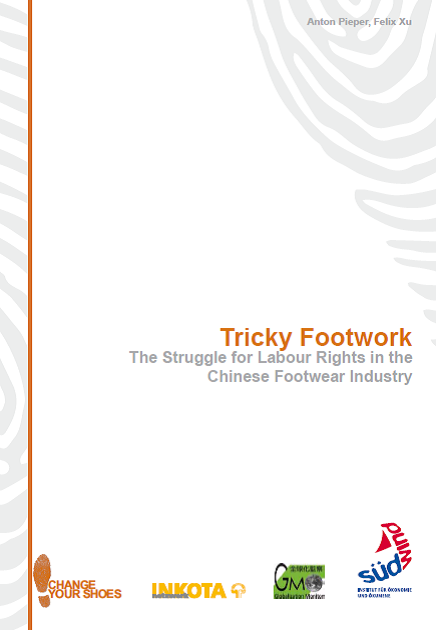
Tricky Footwork – Executive Summary
Collected in interviews conducted in 2015 for this study, testimonies attest to the fact that labour law violations are still a common phenomenon in the Chinese leather and footwear industry. The people who work at the factories that supply European brands such as Adidas, Clarks and ECCO told us of, among other infringements, salaries that are far below a living wage, involuntary overtime, insufficient protection from health and safety risks, insufficient protection for young workers, disrespectful treatment of workers, no right to assembly, state violence to suppress strikes, unpaid social insurance contributions and insufficient severance payments.
All of the above is happening despite the fact that China has very progressive labour laws, especially in comparison with other producing countries. Workers enjoy many protections, at least on paper, although not freedom of assembly or freedom of association. What is more, most large footwear companies today have codes of conduct meant to curb labour law infringements by suppliers.
The present study takes a closer look at labour rights in the Chinese leather and footwear industry. Which economic and political changes have been made in recent years in both sectors, and how have these developments affected the situation of industry workers?
China is, by a wide margin, the top global producer and exporter of footwear. The European Union is in turn the largest import market for leather and footwear produced in China. For the European market and EU-based industries – which are increasingly defined by globalisation and restructuring – the rise of the Chinese footwear industry has been of pivotal importance. So anyone who wants to know about the social and environmental conditions under which (leather) footwear sold in Europe is produced must look at China.
This study is a product of the international campaign Change Your Shoes. 18 European and Asian organisations have come together to raise awareness about problems in the production of leather and footwear. Research for the campaign was conducted in China, India, Indonesia, Eastern Europe, Italy and Turkey, with the aim of improving social and environmental conditions in the global leather and footwear industry.
The following study first gives an overview of recent developments in the European leather and footwear industry (Chapter 2) then goes on to look at the structures, geography and legal framework of the Chinese leather and footwear industry (Chapter 3). Chapter 4 takes a closer look at the Chinese legislation relevant to labour rights. This understanding of the legal framework aids analysis of the interviews with industry workers presented in Chapter 5.
We interviewed 47 workers from three footwear factories in Guangdong Province, one of the most heavily industrialised regions of China and the heartland of Chinese footwear production. These interviews, conducted in late 2015, provide a clear picture of current developments in the footwear industry. The study ends with recommendations on how various stakeholders might improve social and environmental conditions in the Chinese leather and footwear industry (Chapter 6).
In the past, the branch has achieved record growth while ignoring international standards such as the core labour standards of the International Labour Organisation (ILO). This has led to an increase in labour disputes in recent years, many of which were ended violently. At the same time there are many signs that workers are becoming more organised. The gains made by civil society protests presented in the study at hand are a clear sign that this is so.
The study draws the conclusion that improvements in working conditions are sorely needed in all investigated factories and in the footwear industry as a whole. We therefore urgently recommend that China ratify and implement ILO Convention 87 on freedom of association and ILO Convention 98 on the right to collective bargaining. Workers shall receive a legally guaranteed right to found and run independent trade unions. We further recommend that the regional government of Guangdong provide better protection for young workers, for example prohibiting overtime for young people, as already implemented in other provinces. The problem of forced labour can in our opinion only be solved if workers in China’s footwear industry receive a living wage for an eight-hour workday.
On the positive side it must be noted that there are already a number of laws and regulations in China that often make it possible for Chinese workers to obtain legal redress for infringements of their rights. Furthermore it was found that men and women in general receive equal pay, that child labour is no longer common practice in the footwear industry and that most workers have proper lawful contracts.
|
WHO ARE WE? CHANGE YOUR SHOES is a partnership of 15 European and 3 Asian organisations. We believe that workers in the shoe supply chain have a right to a living wage and to safe working conditions, and that consumers have a right to safe products and transparency in the production of their shoes. This report has been produced as part of the campaign. This report has been produced with the financial assistance of the European Union, as well as oft he chorchly development service, Bread for the World and ENGAGEMENT GLOBAL on behalf of BMZ, the German Federal Ministry for Economic Cooperation and Development. The contents of this report are the sole responsibility of SÜDWIND, INKOTA and Globalization Monitor. |
